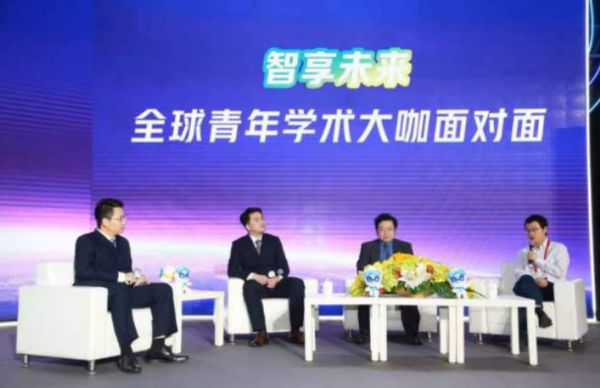On November 18th, Dialogues with Global Young Scholars was held at South China University of Technology, Guangzhou, China. The theme of the conference was “Innovation, Youth and Future”. Four young scholars who had made outstanding contributions to the field of quantum physics and the other 35 under-35-year-old scholars among the laureates of MIT Technology Review‘s Innovators were invited.
Dai Lei, a research professor at the Shenzhen Institutes of Advanced Technology of the Chinese Academy of Sciences, introduced the key role of gut microbiota in health. He set forth the research breakthroughs made in areas including design principles of synthetic organisms, synthetic yeast chromosomes, and genetically modified bacteria as a treatment for tumors, where the research is brimming with both opportunities and challenges. He also emphasized the significance of biotechnology in the boom of technological innovation.
He Ke, a professor from the Department of Physics at Tsinghua University, elaborated on the findings regarding the molecular beam epitaxial growth of low-dimensional topological quantum material systems, as well as its electron configuration and quantum effect. He pointed out that as the microscopic world is dominated by laws of quantum mechanics, it is possible for topological quantum computation to solve the issue of error correction in quantum computing.
Chen Yunji, a research professor at the Institute of Computing Technology of the Chinese Academy of Sciences, introduced the principles, design strategies and significance of deep learning processors. He believes that in the future, every computer may need a deep learning processor of its own. His vision for the future is to “carry around AlphaGo in pockets”.
Radha Boya, a professor of nanoscience from the Department of Physics & Astronomy at the University of Manchester delivered a presentation on the latest findings and developments in the field of graphene. Due to the COVID-19 pandemic, the lecture was given via a video recording. She believes that by processing graphene materials with filtration technologies to achieve the same effect as atomic-scale capillaries do, we can help solve the key issue of seawater desalination across the globe.
The event was held during the finals of 6th China International College Students’ “Internet+” Innovation and Entrepreneurship Competition. Nearly 500 students, teachers, as well as representatives of the contestants and the South China University of Technology attended the event. Live-streaming views of the event has hit more than 100,000 online.
(Syndicated press content is neither written, edited or endorsed by ED Times)
Read more:
Ajinomoto Is Not Toxic, Non-Veg And Doesn’t Cause Heart Attacks





































